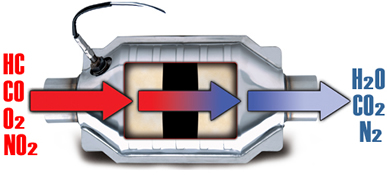Converter Catalog
Our online converter catalog offers the ability to look up converters for the car you are working on. Some exhaust applications are being added, as well.
Our Products
Come see what Full Line Exhaust offers.
New Customer Registration
Sign up here to become a new customer.
FLE-TLE.com
This is our online ordering system for our exhaust shops. It has a vast array of features for financial management and order tracking.
Converter Basics
The purpose of any catalytic converter is to reduce harmful emissions from the exhaust of a "properly tuned" combustion engine. It accomplishes this through a combination of heat and a precious metal catalyst that causes the harmful emissions to either oxidize or reduce to safe elements in the exhaust flow. If the engine is out of tune and not calibrated to OEM specs, the catalytic converter's efficiency is greatly diminished and could lead to a converter failure.
The precious metal catalyst is bound to an extruded ceramic honeycomb substrate. The ceramic has hundreds of flow channels that allow the exhaust gasses to come in contact with a maximum amount of surface area where the catalyst reaction takes place. The catalyst must come in direct contact with the exhaust gasses for the reaction to take place.
If the ceramic inside your converter becomes clogged or coated with carbon, lead or oil, then the converter's efficiency is greatly reduced.
There are three basic types of automotive catalytic converters: Two-Way , Three-Way and Three-Way+Air . Each type uses a slightly different method and chemistry to reduce the harmful elements in exhaust emissions. Early model converters used a pelletized catalyst, but most modern converters are now designed with a free-flowing honeycomb ceramic catalyst. The type of converter required on a particular vehicle varies with model year, engine size and vehicle weight. Some vehicles use more than one type of converter to meet emission reduction standards.
Pre-Converter and Main Converter
Each of the three types of converters mentioned at left have a common need in order to function properly. Each needs to reach a minimum operating temperature before any emission reduction or oxidation takes place. This warm-up period immediately after a vehicle is started is when the catalytic converter is least efficient and the vehicle expels the most pollutants. Some vehicles employ a pre-converter in the exhaust system immediately after the manifold to help during this warm-up period. The pre-converter's small size and proximity to the engine allow it to heat up and start functioning in less time than the main converter. It also pre-heats the exhaust gasses and helps the main converter reach operating temperature sooner.
Two-Way Oxidation Converter
Two-Way converter, used on cars between 1975-1980, oxidizes unburned harmful hydrocarbons and carbon monoxide along with secondary oxygen into water and carbon dioxide. HC, CO, O2 OXIDIZE TO H20 and CO2.
Three-Way Reduction/Oxidation
A Three-Way converter is a triple purpose converter. It reduces nitrous oxides into nitrogen and, like the two-way converter, it oxidizes unburned harmful hydrocarbons and turns carbon monoxide into water and carbon dioxide. NOx REDUCES TO N2 HC, CO OXIDIZES TO H20 and CO2
Three-Way+Air Reduction/Oxidation Converter
A Three-Way+Air converter performs the same function as the Three-Way converter: It oxidizes and reduces. The difference is the addition of secondary air between the two internal catalyst substrates that improves the oxidation capabilities of the converter. The secondary air is pumped into the middle of the converter between the two separate catalyst substrates. The front performs the reduction and the back ceramic performs the oxidation. It's like having two converters in one. NOx REDUCES TO N2 HC, CO, O2 OXIDIZES TO H20 and CO2

Dothan
151 Tinker Court
Dothan, AL 36303
Toll Free: 1-800-264-8035
Atlanta
550 Wharton Drive
Atlanta, GA 30336
Toll Free: 1-800-467-9917
Birmingham
1000 11th Court West
Birmingham, AL 35204
Toll Free: 1-800-553-5582
Tifton
197 Upper Ty Ty Rd
Tifton, GA 31793
Toll Free: 1-800-848-1072
Fulton
801 W. Highland Drive
Fulton, KY 42041
Toll Free: 1-800-326-7572
Daytona
1715 Nova Road
Holly Hill, FL 32117
Toll Free: 1-800-342-1870
Nashville
5022 Harding Place
Nashville, TN 36303
Toll Free: 1-866-808-7680
West Palm Beach
7340 Westport Place
West Palm Beach FL 33610
Toll Free: 1-800-276-6399
Tampa
5210 E Hanna Ave
Tampa, FL 35204
Toll Free: 1-800-282-3854
Wynne
102 Murray Avenue
Wynne, AR 72396
Toll Free: 1-800-851-5905
Memphis
1886 E. Brooks Road
Memphis, TN 30336
Phone: (901) 937-5373
Jackson
4209 Space Center Drive
Jackson, MS 39209
Phone: 1-800-553-5582
12 Locations to serve you better!
© 2024 Full Line Exhaust, Inc.

Site Map